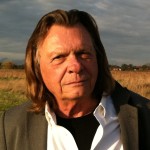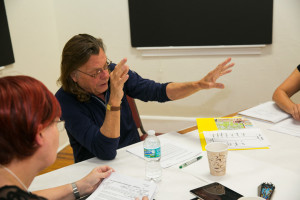
We will pay close attention, in minute detail, to all the elements that go into writing a poem. So: we’ll do word by word, line by line readings. Frost said that the primary way to get to the reader’s heart and mind is through the reader’s ear. The sound, the noise of a poem, demands our attention. We must be tough, honest and direct with each other’s work and also be generous, thoughtful and never condescending or dismissive. A good workshop can do both. Bring in three or four poems, seventeen copies of each, for discussion.
THOMAS LUX 1946-2017
Acclaimed poet and teacher, born in Northampton, Massachusetts, in 1946 to working class parents, Thomas Lux attended Emerson College and the University of Iowa. He began publishing haunted, ironic poems that owed much to the Neo-surrealist movement in the 1970s. From his first book Memory’s Handgrenade (1972), Lux’s poetry gradually evolved toward a more direct treatment of immediately available, though no less strange, human experience. Using ironic or sardonic speakers, startlingly apt imagery, careful rhythms, and reaching into history for subject matter, Lux created a body of work that is at once accessible and complex, wildly imaginative and totally relevant. Known for pairing humor with sharp existentialism, Lux commented in the Los Angeles Times, “I like to make the reader laugh—and then steal that laugh, right out of the throat. Because I think life is like that, tragedy right alongside humor.”
Lux’s first collections, including Memory’s Handgrenade and Sunday: Poems (1979), were grounded in the neo-surrealist techniques of contemporaries like James Tate and Bill Knott. Describing his own progress in an interview with the Cortland Review, he said: “I kind of drifted away from Surrealism and the arbitrariness of that. I got more interested in subjects, identifiable subjects other than my own angst or ennui or things like that. I got better and better, I believe, at the craft. I paid more and more attention to the craft. Making poems rhythmical and musical and believable as human speech and as distilled and tight as possible is very important to me. I started looking outside of myself a lot more for subjects. I read a great deal of history, turned more outward as opposed to inward.”
Lux’s other collections include New and Selected Poems: 1975-1995 (1997), The Street of Clocks (2001), The Cradle Place (2004), God Particles (2008), and To the Left of Time (2016). He was also the editor of I Am Flying Into Myself: Selected Poems of Bill Knott (2017). Thomas Lux taught at Sarah Lawrence for over 20 years, as well as at the Warren Wilson MFA program, and the Georgia Institute of Technology. In the Cortland Review interview, he described teaching’s greatest rewards: “you see people get excited by poetry. You see their lives changed by poetry. You see someone beginning to learn how to articulate and express themselves in this very tight art form, in this very distilled manner. You see all sorts and hear all sorts of really human stuff, really human business.” His many awards and honors include the Kingsley Tufts Poetry Award, a Guggenheim fellowship, a Mellon fellowship, an honorary degree from Emerson College, and three grants from the National Endowment for the Arts.
He was Bourne Professor of Poetry at The Georgia Institute of Technology in Atlanta and directed the McEver Visiting Writers Program and Poetry@Tech. Lux published over a dozen books of poetry; including Memory’s Handgrenade (1972), The Blind Swimmer: Selected Early Poems 1970–1975 (1996), God Particles (2008), Child Made of Sand (2012), and most recently, To the Left of Time (2016). See the full bibliography.
 Thomas Lux chaired the Advisory Board of the Palm Beach Poetry Festival and participated as teaching faculty in every festival until his death in February 2017. His signature workshop, Word by Word, Line by Line, was always among the first choices of applicants through these years. He lent unfailing and generous support to the festival’s founder, board, to all of our staff, and to all of the festival faculty. We miss him, and we will continue to read his work and hear his voice always.
Thomas Lux chaired the Advisory Board of the Palm Beach Poetry Festival and participated as teaching faculty in every festival until his death in February 2017. His signature workshop, Word by Word, Line by Line, was always among the first choices of applicants through these years. He lent unfailing and generous support to the festival’s founder, board, to all of our staff, and to all of the festival faculty. We miss him, and we will continue to read his work and hear his voice always.
View poet's page
